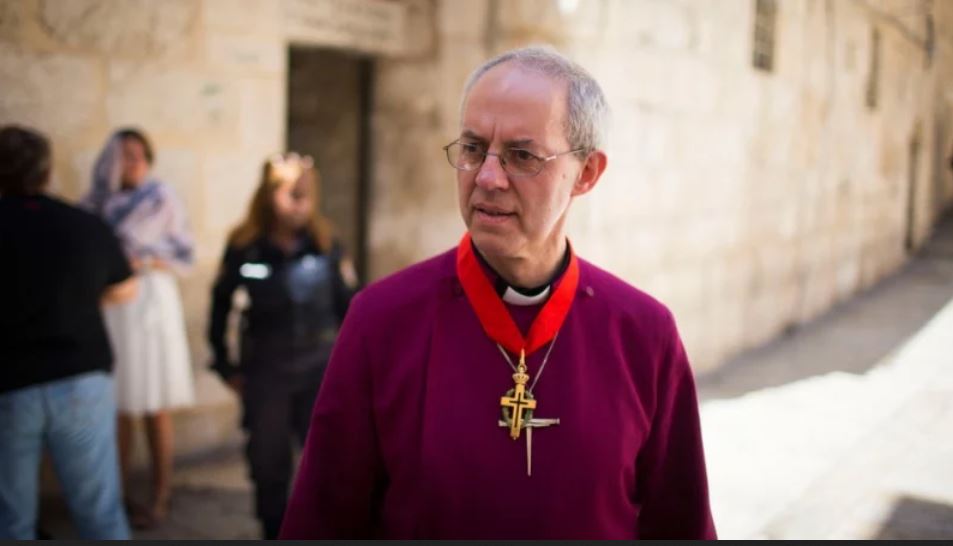AhlulBayt News Agency: The archbishops of Canterbury and Westminster have expressed concern about the consequences of moving the British embassy from Tel Aviv to occupied al-Quds, asking the prime minister to reconsider her decision.
According to a spokesman, the Archbishop of Canterbury Justin Welby raised concerns about the decision, which was made by British Prime Minister Liz Truss last month during a meeting with her Israeli counterpart Yair Lapid.
The spokesman told Middle East Eye that the archbishop is concerned about the possible consequences of the decision before a bilateral agreement is reached between the Palestinians and the Israeli regime.
The spokesman added that Welby is in contact with Christian leaders in the occupied territories and is praying for peace in al-Quds.
Moving the embassy to occupied al-Quds will change Britain’s long-standing position on the Palestinians. Britain has long maintained its embassy in Tel Aviv as part of its longstanding policy.
By moving the British embassy to occupied al-Quds, Truss would be following in the footsteps of Donald Trump, the former President of the United States, who moved the US embassy to al-Quds despite worldwide condemnations.
The Anglican and Catholic churches announced in a statement that they stand shoulder to shoulder and oppose the possible transfer of the British embassy to the holy city.
The Archbishop of Canterbury made his concerns public hours after Britain’s most senior Catholic warned in a letter to Truss about the consequences of her decision.
Cardinal Vincent Nichols, Archbishop of West Winchester, also asked Truss to reconsider her decision.
Nichols, head of the Catholic Church in England and Wales, said he had written to the prime minister expressing his deep concern over the move.
“Such a relocation of the UK embassy would be seriously damaging to any possibility of lasting peace in the region and to the international reputation of the United Kingdom,” he said.
The cardinal added that Pope Francis and leaders of churches in Israel and Palestine had “long called for the international status quo on occupied al-Quds to be upheld, in accordance with the relevant UN resolutions.”
Meanwhile, other churches in the UK may also oppose the decision.
/129
According to a spokesman, the Archbishop of Canterbury Justin Welby raised concerns about the decision, which was made by British Prime Minister Liz Truss last month during a meeting with her Israeli counterpart Yair Lapid.
The spokesman told Middle East Eye that the archbishop is concerned about the possible consequences of the decision before a bilateral agreement is reached between the Palestinians and the Israeli regime.
The spokesman added that Welby is in contact with Christian leaders in the occupied territories and is praying for peace in al-Quds.
Moving the embassy to occupied al-Quds will change Britain’s long-standing position on the Palestinians. Britain has long maintained its embassy in Tel Aviv as part of its longstanding policy.
By moving the British embassy to occupied al-Quds, Truss would be following in the footsteps of Donald Trump, the former President of the United States, who moved the US embassy to al-Quds despite worldwide condemnations.
The Anglican and Catholic churches announced in a statement that they stand shoulder to shoulder and oppose the possible transfer of the British embassy to the holy city.
The Archbishop of Canterbury made his concerns public hours after Britain’s most senior Catholic warned in a letter to Truss about the consequences of her decision.
Cardinal Vincent Nichols, Archbishop of West Winchester, also asked Truss to reconsider her decision.
Nichols, head of the Catholic Church in England and Wales, said he had written to the prime minister expressing his deep concern over the move.
“Such a relocation of the UK embassy would be seriously damaging to any possibility of lasting peace in the region and to the international reputation of the United Kingdom,” he said.
The cardinal added that Pope Francis and leaders of churches in Israel and Palestine had “long called for the international status quo on occupied al-Quds to be upheld, in accordance with the relevant UN resolutions.”
Meanwhile, other churches in the UK may also oppose the decision.
/129

